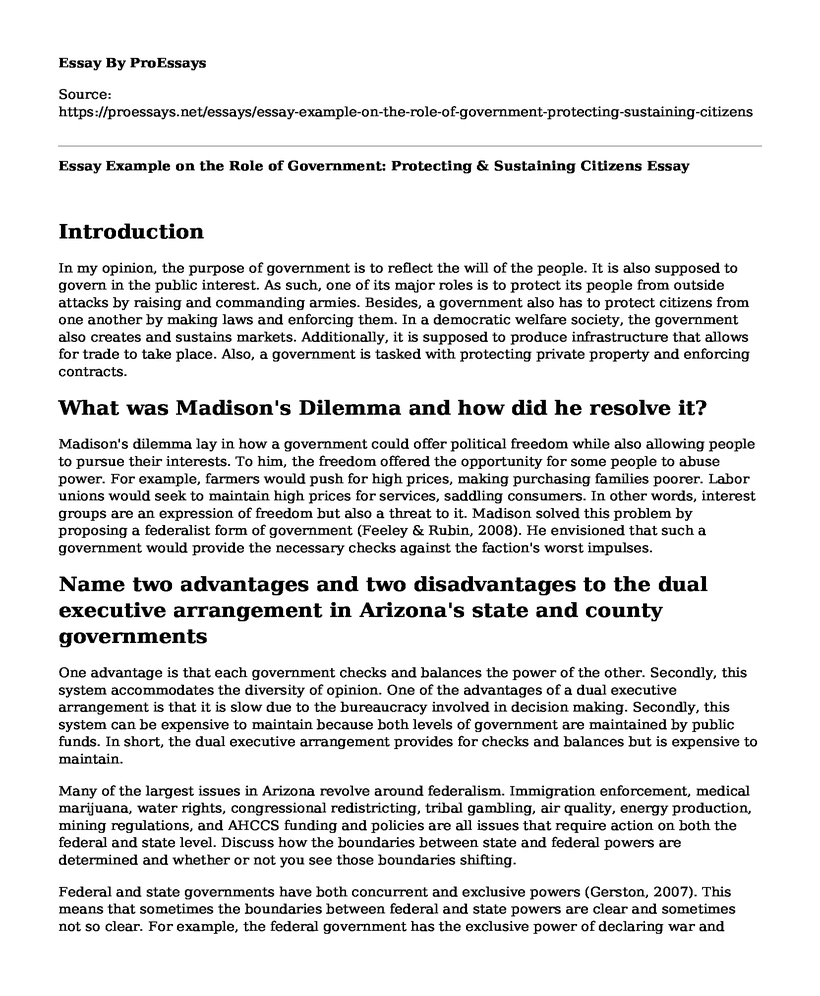Introduction
In my opinion, the purpose of government is to reflect the will of the people. It is also supposed to govern in the public interest. As such, one of its major roles is to protect its people from outside attacks by raising and commanding armies. Besides, a government also has to protect citizens from one another by making laws and enforcing them. In a democratic welfare society, the government also creates and sustains markets. Additionally, it is supposed to produce infrastructure that allows for trade to take place. Also, a government is tasked with protecting private property and enforcing contracts.
What was Madison's Dilemma and how did he resolve it?
Madison's dilemma lay in how a government could offer political freedom while also allowing people to pursue their interests. To him, the freedom offered the opportunity for some people to abuse power. For example, farmers would push for high prices, making purchasing families poorer. Labor unions would seek to maintain high prices for services, saddling consumers. In other words, interest groups are an expression of freedom but also a threat to it. Madison solved this problem by proposing a federalist form of government (Feeley & Rubin, 2008). He envisioned that such a government would provide the necessary checks against the faction's worst impulses.
Name two advantages and two disadvantages to the dual executive arrangement in Arizona's state and county governments
One advantage is that each government checks and balances the power of the other. Secondly, this system accommodates the diversity of opinion. One of the advantages of a dual executive arrangement is that it is slow due to the bureaucracy involved in decision making. Secondly, this system can be expensive to maintain because both levels of government are maintained by public funds. In short, the dual executive arrangement provides for checks and balances but is expensive to maintain.
Many of the largest issues in Arizona revolve around federalism. Immigration enforcement, medical marijuana, water rights, congressional redistricting, tribal gambling, air quality, energy production, mining regulations, and AHCCS funding and policies are all issues that require action on both the federal and state level. Discuss how the boundaries between state and federal powers are determined and whether or not you see those boundaries shifting.
Federal and state governments have both concurrent and exclusive powers (Gerston, 2007). This means that sometimes the boundaries between federal and state powers are clear and sometimes not so clear. For example, the federal government has the exclusive power of declaring war and coining money among other powers. These powers are only reserved for the national government and cannot be exercised by state or local governments.
On the other hand, the state has the exclusive powers of conducting elections and establishing local governments. These powers are a reserve of the state government and the national government has no business in meddling in the affairs of the state government regarding these two issues. However, both federal and state governments have powers of taxation and borrowing money, meaning that both levels of government are likely to find themselves involved in the same affairs that lie in these affairs.
As it emerges, the federal's exclusive powers seem to help the whole nation operate uniformly because I cannot imagine how trade would prosper is every state was to be in charge of printing its own money or make laws touching on naturalization. In regards to the state, what emerges is that the states possess the power to perform functions that fit their realities and needs such as education and health care.
I see these boundaries shifting because historically, the governments seem to be in constant competition. For example, I see a further presence of federal government in state affairs through the distribution of aid, grants, and incentives such as the categorical federal grants that come with strings attached. Also, as highlighted by US v. Lopez in 1995 involving gun laws, the states have time and again pushed back on encroachment by the federal government (Gerston, 2007).
References
Feeley, M. M., & Rubin, E. L. (2008). Federalism: Political identity and tragic compromise. Ann Arbor: University of Michigan Press.
Gerston, L. N. (2007). American federalism: A concise introduction. Armonk, New York: M.E. Sharpe.
Cite this page
Essay Example on the Role of Government: Protecting & Sustaining Citizens. (2023, Feb 27). Retrieved from https://proessays.net/essays/essay-example-on-the-role-of-government-protecting-sustaining-citizens
If you are the original author of this essay and no longer wish to have it published on the ProEssays website, please click below to request its removal:
- History of the United States Marine Corps Essay Example
- Essay Sample on if America Had a Parliament
- Essay Sample on Intelligence Trends in South Africa
- The Government Audit Standards Essay Example
- Essay Example on the Art of China: Ancient Traditions to Modern Era
- Six Amendments: Changing the Constitution for a Better Future - Essay Sample
- U.S. Government: A Dynamic Political System of 3 Branches - Essay Sample







